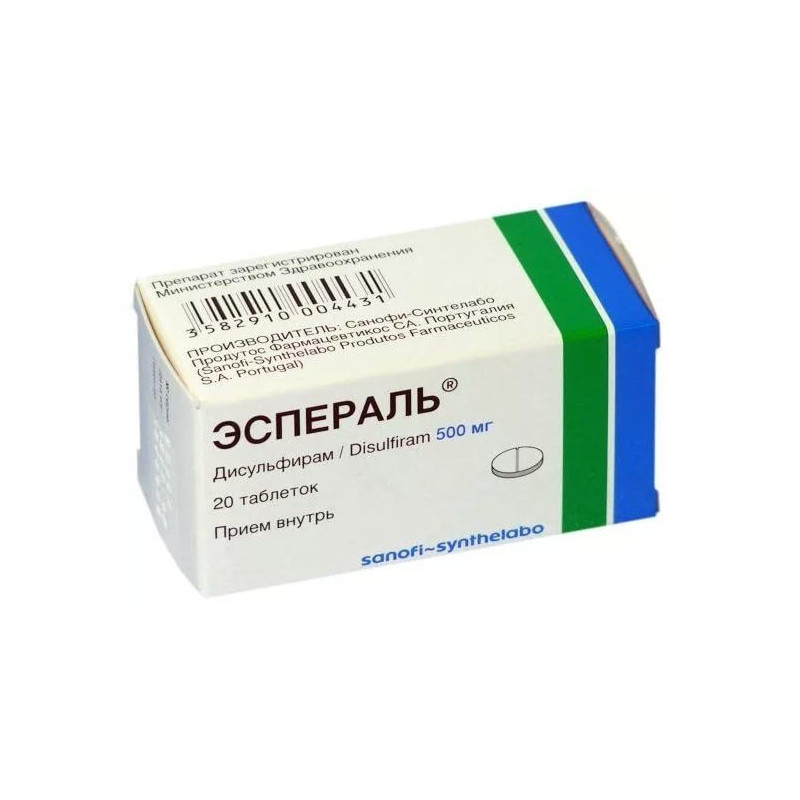



 All payments are encrypted via SSL
All payments are encrypted via SSL
 Full Refund if you haven't received your order
Full Refund if you haven't received your order
Pills
1 pill contains: disulfiram - 0.5 g.
Excipients: polyvidone K 30, carmellose sodium, Magnesium stearate, microcrystalline cellulose, purified water.
In a plastic bottle of 20 tablets. In a cardboard bundle one bottle.
The action of disulfiram is based on the blockade of acetaldehyde hydrogenase, which is involved in the metabolism of ethyl alcohol.
This leads to an increase in the metabolite concentration of ethyl alcohol - acetaldehyde, which causes negative sensations (flushing, nausea, vomiting, tachycardia, lowering blood pressure, etc.), which make alcohol use extremely unpleasant after taking the drug.
This leads to a conditioned reflex aversion to the taste and smell of alcoholic beverages.
The maximum therapeutic effect is achieved 12 hours after oral administration and may last for 10-14 days after discontinuation of treatment.
- Treatment and prevention of recurrence of chronic alcoholism.
- Additionally, the drug is used as a detoxification agent for chronic nickel poisoning.
Absolute:
- Severe liver failure.
- Diabetes.
- Epilepsy and convulsive syndrome of any genesis.
- Mental illness.
- Pregnancy.
- Lactation period.
- Increased individual sensitivity to the drug.
Relative:
- Renal failure.
- Hypothyroidism.
Contraindicated use during pregnancy and breastfeeding.
Treatment is prescribed after a thorough examination of the patient and warning about the consequences and complications.
The drug is taken orally on 0.5 g 1 time per day in the morning with meals according to an individual scheme, gradually reducing the dose to 1/2 or 1/4 pill per day.
The dose can be changed upward or downward depending on the response of the patient.
After 7-10 days, a teturamalcic test is carried out (20-30 ml of 40% ethanol (vodka) after taking 0.5 g of the drug), with a weak reaction, the dose of alcohol is increased by 10-20 ml (the maximum dose of vodka is 100-120 ml).
The sample is repeated after 1-2 days in the hospital and after 3-5 days on an outpatient basis, with the correction of doses of alcohol and / or the drug as needed.
In the future, you can use a maintenance dose of 0.15-0.2 g per day for 1-3 years.
Contraindications:
Alcohol: intolerance reaction (flushing, erythema, vomiting, tachycardia). Intake of alcohol and drugs containing alcohol should be avoided. Unwanted combinations.
Isoniazid: impaired behavior and coordination.
Nitro-5-imidazoles (metronidazole, ornidazole, secnidazole, tinidazole): delirious disorders, confusion.
Phenytoin: a significant and rapid rise in the concentration of phenytoin in the blood plasma with toxic symptoms (suppression of its metabolism).
If combinations cannot be avoided, clinical monitoring and control of plasma concentrations of the drug during and after disulfiram should be carried out.
Combinations that require caution:
Warfarin (and other oral anticoagulants): an increased effect of oral anticoagulants and the risk of bleeding (reduction of Warfarin metabolism in the liver). It is recommended that more frequent monitoring of the level of prothrombin in the blood and adjustment of the dose of anticoagulants within 8 days after discontinuation of disulfiram.
Theophylline: Disulfiram inhibits theophylline metabolism. As a result of this, the dose of theophylline should be adjusted (reduced dosage), depending on the clinical symptoms and the plasma concentration of the drug.
Benzodiazepines: Disulfiram may enhance the sedative effect of benzodiazepines by inhibiting their oxidative metabolism (especially chlordiazepoxide and diazepam). Benzodiazepine dosage should be adjusted according to clinical manifestations.
Tricyclic antidepressants: increased reaction to alcohol intolerance (if patients receiving disulfiram, take alcoholic beverages).
The combination of disulfiram - ethanol causes depression of consciousness, even coma, cardiovascular collapse, neurological complications.
Symptomatic treatment.
Store at temperatures below 25 ° C.
